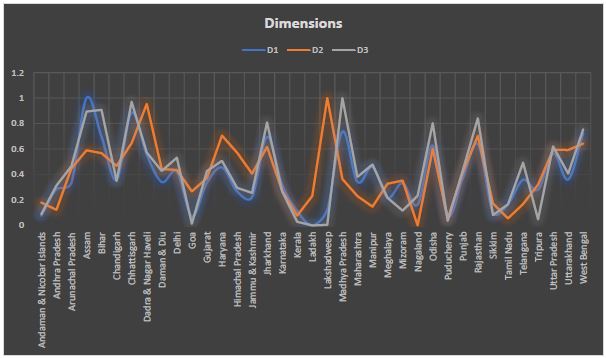A Nationwide Comparative Study on Financial Inclusion through PMJDY
DOI:
https://doi.org/10.5281/zenodo.12493037Keywords:
financial inclusion, fii, inverse euclidean distance, banking, states, pmjdyAbstract
Purpose - Financial inclusion refers to the provision of affordable financial products and services to all members of society without any discrimination. ‘Pradhan Mantri Jan-Dhan Yojana’ is a government scheme to provide a zero-balance account to every citizen in India.
Methodology- This study creates a financial inclusion index based on three dimensions: banking penetration, disbursement, and services. And distributed states as per their index score in three levels: high, middle, and low. There is a continuum from 0 (no inclusion) to 1 (complete inclusion).
Findings- The study finds that six out of 37 states showed high progress in financial inclusion, 14 came under the middle level, and 17 went to the low level. Chhattisgarh scored high on in index, while Puducherry had the lowest score.
Originality- This study will help the policymakers and regulators make the structural framework for low-inclusion states. This study may be unique in the field of evaluating the effectiveness of the PMJDY plan in states as per targeted population.
Downloads
References
Bagli, S., & Dutta, P. (2012). A study of financial inclusion in India. Radix International Journal of Economics & Business Management, 1(8), 1–18.
Beck, T., Demirguc-Kunt, A., & Peria, M. S. M. (2007). Reaching out: Access to and use of banking services across countries. Journal of Financial Economics, 85(1), 234–266.
Cámara, N., & Tuesta, D. (2014). Measuring financial inclusion: A muldimensional index. BBVA Research Paper, 14/26.
Chakravarty, S., & Pal, R. (2010). Measuring financial inclusion : An axiomatic approach.
Chakravarty, S. R., & Pal, R. (2013). Financial inclusion in India: An axiomatic approach. Journal of Policy Modeling, 35(5), 813–837.
Chattopadhyay, S. K. (2011). Financial inclusion in India: A case-study of West Bengal.
Kuri, P. K., & Laha, A. (2011). Financial inclusion and human development in India: An inter-state analysis. Indian Journal of Human Development, 5(1), 61–77.
Maity, S., & Sahu, T. N. (2020). Role of public sector banks towards financial inclusion during pre and post introduction of PMJDY: A study on efficiency review. Rajagiri Management Journal, 14(2), 95–105. https://doi.org/10.1108/RAMJ-03-2020-0009.
National Commission on Population, & Ministry of Health & Family Welfare. (2020). Census of India 2011 population proiections for India and states 2011-2036. Report of the Technical Group on Population Proiecttons.
Piñeyro, C. M. Z. (2013). Financial inclusion index: Proposal of a multidimensional measure for Mexico. Revista Mexicana de Economía y Finanzas. Nueva Época/Mexican Journal of Economics and Finance, 8(2), 157–180.
Pradhan Mantri Jan-Dhan Yojana | Department of Financial Services | Ministry of Finance. (2022, December 7). https://pmjdy.gov.in/statewise-statistics.
Sarma, M. (2008a). Index of financial inclusion. Working Paper.
Sarma, M. (2008b). Index of financial inclusion. Working Paper.
Sarma, M. (2012). Index of financial inclusion - A measure of financial sector inclusiveness, 1.
Yadav, V., Singh, B. P., & Velan, N. (2021). Multidimensional financial inclusion index for Indian states. Journal of Public Affairs, 21(3), e2238.
Yorulmaz, R. (2013). Construction of a regional financial inclusion index in Turkey. BDDK Bankacılık ve Finansal Piyasalar Dergisi, 7(1), 79–101. Available at: https://dergipark.org.tr/en/pub/bddkdergisi/issue/57353/812642.

Downloads
Published
How to Cite
Issue
Section
License
Copyright (c) 2024 Sagnik Maity, Dr. Amit Majumder

This work is licensed under a Creative Commons Attribution 4.0 International License.
Research Articles in 'Management Journal for Advanced Research' are Open Access articles published under the Creative Commons CC BY License Creative Commons Attribution 4.0 International License http://creativecommons.org/licenses/by/4.0/. This license allows you to share – copy and redistribute the material in any medium or format. Adapt – remix, transform, and build upon the material for any purpose, even commercially.









